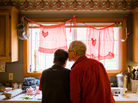by Salman Hameed
Last week, NPR had a thoughtful and interesting series on "nones" - people who do not affiliate with any religion - in the US. It was prompted by recent polls that show that the number of "nones" has been increasing steadily for the past few decades and that the younger people today are not only more religious unaffiliated than their elders today, but that they are more religiously unaffiliated than their younger counterparts in the past (also see an earlier post: Global Religious Landscape - Young Muslims and the Unaffiliated). This is from the Gallup poll for the US:
And here is a Pew survey that breaks the data by age:
Here are particular characteristics of this group:
I have posted below links to the full series. If you have time to listen to just one, then check out the first one at the bottom (it includes an interview with sociologist, Robert Putnam. There they talk about the possible reasons for the rise of "nones", including the idea that it is because of decreasing importance of social institutions in general. But while listening to the full series, I was wondering about the possible trends in the Muslim world. We know that the median age of Muslims in the world is 23. What kind of trends should we expect? While the importance of religion is quite high in much of the Muslim world (see this post here for plots on this), that may not tell us much about the diversity of beliefs (i.e. religion can be very important, but the way people practice it can vary a lot). Pew did ask a question about perceptions of religious orthodoxy within Islam. In particular, they asked if "there is only one interpretation of Islam" or can it be interpreted in different ways. Not surprisingly, a majority of respondents in most countries agreed with the single interpretation statement, with Morocco, Tunisia, the Palestinian Territories, Lebanon and Iraq being the exceptions, with under 50%. Interestingly, Muslims in the US are outliers on this:
Much to ponder about. Here are the links to this NPR special. If you have time, you should listen to all of these as they provide a glimpse of the complex ways people deal with religion and life.
Last week, NPR had a thoughtful and interesting series on "nones" - people who do not affiliate with any religion - in the US. It was prompted by recent polls that show that the number of "nones" has been increasing steadily for the past few decades and that the younger people today are not only more religious unaffiliated than their elders today, but that they are more religiously unaffiliated than their younger counterparts in the past (also see an earlier post: Global Religious Landscape - Young Muslims and the Unaffiliated). This is from the Gallup poll for the US:
And here is a Pew survey that breaks the data by age:
Here are particular characteristics of this group:
- comprises atheists and agnostics as well as those who ally themselves with "nothing in particular"
- includes many who say they are spiritual or religious in some way and pray every day
- overwhelmingly says they are not looking to find an organized religion that would be right for them
- is socially liberal, with three-quarters favoring same-sex marriage and legal abortion
- Perhaps most striking is that one-third of Americans under 30 have no religious affiliation.
I have posted below links to the full series. If you have time to listen to just one, then check out the first one at the bottom (it includes an interview with sociologist, Robert Putnam. There they talk about the possible reasons for the rise of "nones", including the idea that it is because of decreasing importance of social institutions in general. But while listening to the full series, I was wondering about the possible trends in the Muslim world. We know that the median age of Muslims in the world is 23. What kind of trends should we expect? While the importance of religion is quite high in much of the Muslim world (see this post here for plots on this), that may not tell us much about the diversity of beliefs (i.e. religion can be very important, but the way people practice it can vary a lot). Pew did ask a question about perceptions of religious orthodoxy within Islam. In particular, they asked if "there is only one interpretation of Islam" or can it be interpreted in different ways. Not surprisingly, a majority of respondents in most countries agreed with the single interpretation statement, with Morocco, Tunisia, the Palestinian Territories, Lebanon and Iraq being the exceptions, with under 50%. Interestingly, Muslims in the US are outliers on this:









No comments:
Post a Comment